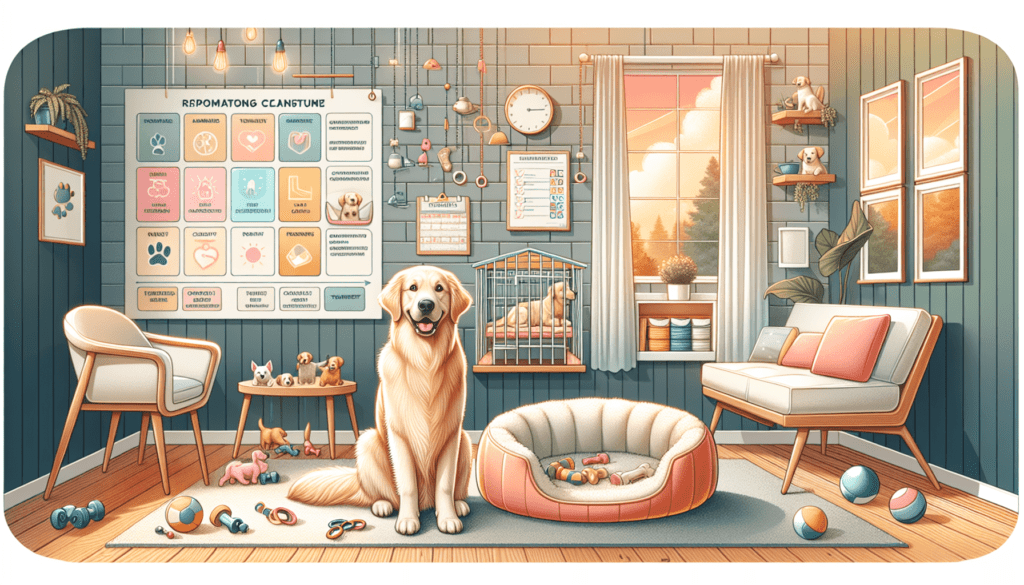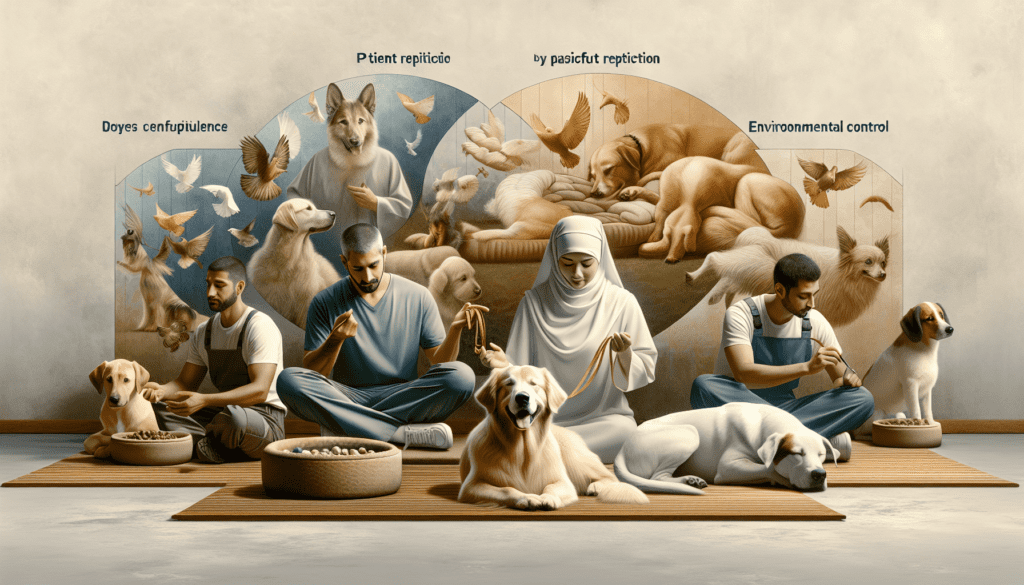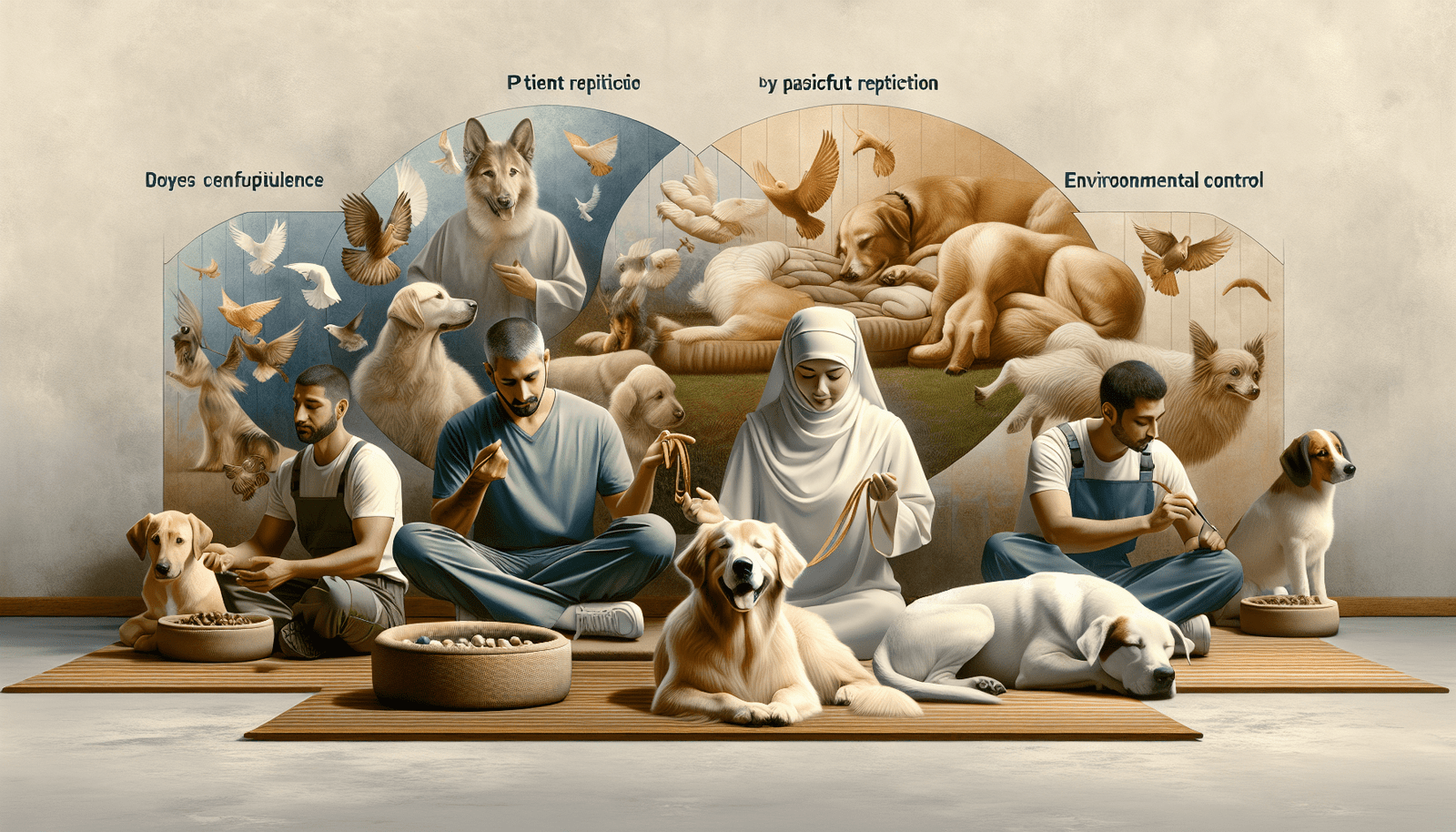Having a consistent routine is crucial for managing anxiety in dogs. When it comes to dealing with anxiety, dogs thrive on predictability and stability. By establishing a consistent schedule, you can provide a sense of security and help alleviate their anxiety. From regular feeding times to structured exercise and training sessions, maintaining consistency in your dog’s daily life can make a significant difference in their overall well-being. In this article, we will explore the role that consistency plays in managing anxiety in dogs and discover practical strategies to help create a calming and stable environment for your furry friend.
Understanding Anxiety in Dogs
Anxiety in dogs is a condition that can significantly impact their quality of life and overall well-being. It is important to have a clear understanding of what anxiety looks like in dogs in order to effectively manage and alleviate their symptoms.
Definition of anxiety in dogs
Anxiety in dogs can be defined as a state of distress or unease triggered by various stimuli or situations. Dogs with anxiety may experience excessive worry, fear, or nervousness, leading to behavioral and physical manifestations of their anxiety.
Causes of anxiety in dogs
Anxiety in dogs can have various causes, including genetics, past traumatic experiences, lack of socialization, separation from their owners, changes in their environment or routine, or medical conditions. Identifying the underlying cause is crucial in implementing effective management strategies.
Common signs and symptoms of anxiety
It is important to recognize the signs and symptoms of anxiety in dogs to provide them with the necessary support and treatment. Common signs of anxiety include excessive barking or whining, destructive behavior, restlessness, trembling or shaking, panting, pacing, aggression, excessive licking or chewing, excessive shedding, and changes in appetite.
Importance of Consistency in Managing Anxiety
Consistency plays a crucial role in managing anxiety in dogs. By providing a predictable and structured environment, dogs feel secure and are better equipped to cope with their anxiety.
Creating a predictable environment
Establishing a predictable environment involves ensuring that your dog knows what to expect in their surroundings. Avoid sudden changes or rearrangements in their living areas, keep their belongings and toys in consistent places, and maintain a calm and stable atmosphere at home.
Establishing routine and structure
A consistent daily routine can significantly help reduce anxiety in dogs. Dogs thrive on predictability, so establishing a regular schedule for feeding, exercise, and sleep creates a sense of stability and security for them.
Reducing uncertainty and fear
Consistency helps reduce uncertainty and fear in anxious dogs. By consistently providing positive experiences and using gentle and patient methods, you can gradually help your dog overcome their fears and build confidence.
Building trust and confidence
Consistency in managing anxiety helps build trust and confidence in dogs. Dogs feel secure when they can rely on their owners to consistently meet their needs and provide a safe and structured environment. This trust and confidence serve as a foundation for managing and reducing anxiety.

Consistency in Daily Routine
Maintaining consistency in your dog’s daily routine is key to managing their anxiety effectively.
Regular feeding schedule
Having a regular feeding schedule helps your dog anticipate meal times and reduces any potential anxiety related to hunger or uncertainty about when they will be fed. Stick to consistent meal times and avoid making sudden changes.
Consistent exercise routine
Exercise plays a vital role in managing anxiety as it releases endorphins and helps dogs expend excess energy. Establish a consistent exercise routine that suits your dog’s needs and abilities, whether it’s daily walks, play sessions, or engaging in specific activities.
Maintaining a consistent sleep schedule
A consistent sleep schedule promotes better rest and relaxation, which is essential for anxious dogs. Set regular bedtimes and wake-up times to establish a consistent sleep routine. Consider creating a comfortable, quiet, and secure sleeping area for your dog as well.
Consistency in Training and Behavior Modification
Consistency in training and behavior modification methods is essential in managing anxiety and helping dogs develop positive behaviors.
Using consistent commands and cues
Consistently using the same commands and cues helps dogs understand what is expected of them and reduces confusion and anxiety. Use clear and concise commands and consistently reinforce them with positive reinforcement.
Implementing a consistent reward system
Establishing a consistent reward system helps reinforce desired behaviors and motivates dogs to exhibit those behaviors more consistently. Use consistent and appropriate rewards, such as praise, treats, or play, to create positive associations with desired behaviors.
Setting clear boundaries and expectations
Consistency in setting boundaries and expectations helps dogs understand what is acceptable behavior and what is not. Establish clear rules and consistently enforce them to provide structure and guidance, which can alleviate anxiety in dogs.
Avoiding inconsistent training methods
Inconsistency in training methods can confuse dogs and hinder their progress in managing anxiety. Avoid switching between different training techniques or mixed messages, as this can lead to uncertainty and increased anxiety. Stick to a consistent approach and communicate expectations clearly.

Consistency in Socialization and Exposure
Consistent socialization and gradual exposure to new experiences are important in managing anxiety, as they help dogs become more confident and comfortable in different situations.
Gradual and consistent exposure to new people and environments
Introduce your dog to new people and environments gradually and consistently. Start with low-stress situations and gradually increase the level of exposure over time, always ensuring your dog feels safe and supported. This approach can help reduce anxiety and build positive associations.
Consistent socialization with other dogs
Regular socialization with other dogs can help anxious dogs develop better social skills and reduce their anxiety in social situations. Arrange regular playdates or enroll your dog in supervised doggy daycare to provide them with consistent opportunities for positive social interactions.
Setting up regular playdates or doggy daycare
Regular playdates or doggy daycare sessions are beneficial for consistently exposing your dog to different dogs and social situations. These experiences can help reduce anxiety, promote socialization, and provide mental and physical stimulation for your dog.
Consistency in Medication and Treatment
Consistency in medication and treatment plans is crucial for managing anxiety in dogs, especially in cases where additional support is needed.
Following a consistent medication schedule
If your dog requires medication to manage their anxiety, ensure that you follow the prescribed dosage and administration schedule consistently. Skipping doses or inconsistent medication schedules can impact the effectiveness of the treatment.
Maintaining regular vet check-ups and adjustments
Regular veterinary check-ups are important to monitor your dog’s progress and make any necessary adjustments to their medication or treatment plan. Consistency in these check-ups ensures that your dog’s anxiety is consistently managed and that any changes can be promptly addressed.
Consistency in implementing behavior modification techniques
If behavior modification techniques are part of your dog’s anxiety management plan, it is important to implement them consistently. Whether it’s desensitization exercises, counter-conditioning, or any other techniques recommended by a professional, consistency in their implementation is key for long-term success.
Consistency in Communication and Interaction
Consistency in communication and interaction with your dog helps establish clear expectations and promotes a stronger bond, which can alleviate anxiety.
Maintaining a consistent tone of voice
Dogs are highly attuned to human emotions, so maintaining a consistent, calm, and reassuring tone of voice can help reduce anxiety. By consistently using a soothing and confident tone, you can provide a sense of security to your anxious dog.
Using consistent body language
Consistent body language is essential in effectively communicating with your dog. Avoid sudden or conflicting body language that may confuse or intimidate your dog. Instead, use relaxed and open body language consistently to promote a calm and positive environment.
Avoiding conflicting or mixed signals
Consistency in signals and cues helps avoid confusion and anxiety in dogs. Be aware of any conflicting or mixed signals you may inadvertently send and strive to provide clear and consistent communication, both verbally and non-verbally.
Consistently rewarding calm and relaxed behavior
Rewarding calm and relaxed behavior consistently helps reinforce these positive behaviors in anxious dogs. Whether through verbal praise, treats, or attention, consistently rewarding calm behavior encourages them to feel more secure and reduces anxiety.
Consistency in Environmental Enrichment
Providing consistent environmental enrichment is essential for managing anxiety in dogs, as it helps keep their minds engaged and provides a sense of comfort and security.
Providing consistent access to toys and interactive games
Offering consistent access to toys and interactive games helps provide mental stimulation and distract anxious dogs from their fears or worries. Ensure that toys are available consistently and rotate them to maintain your dog’s interest.
Setting up a consistent routine for mental stimulation
Incorporating consistent mental stimulation activities into your dog’s routine can help alleviate anxiety by keeping their minds engaged and focused. This can include puzzle toys, scent games, or training sessions that challenge their cognitive abilities.
Consistent exposure to soothing and calming stimuli
Identify the soothing and calming stimuli that work well for your dog and consistently provide access to them. This could include relaxing music, lavender-infused sprays, or cozy blankets. Consistent exposure to these stimuli can create a calming environment for your anxious dog.
Avoiding sudden changes in the dog’s environment
Consistency in the dog’s environment is crucial in managing anxiety. Avoid sudden changes, such as rearranging furniture or introducing new household members, that may disrupt their sense of security. Gradual transitions and maintaining a familiar environment can help reduce anxiety levels.
Monitoring Progress and Adjusting Consistency
Regularly monitoring your dog’s anxiety levels and being flexible to adjust the level of consistency is important for their overall well-being.
Regularly assessing the dog’s anxiety levels
Pay close attention to your dog’s behavior and body language to assess their anxiety levels. Regularly monitor for any changes in symptoms or signs of improvement to gauge the effectiveness of your consistency in managing their anxiety.
Adapting the level of consistency based on progress
As you work on managing your dog’s anxiety, keep in mind that their needs may change over time. Be prepared to adapt the level of consistency in their routine, training, or interactions based on their progress, ensuring that their anxiety management plan remains effective.
Seeking professional guidance if necessary
If you find that your dog’s anxiety is not improving or if their symptoms worsen, it is important to seek professional guidance. A qualified veterinarian or animal behaviorist can provide invaluable support in developing a tailored anxiety management plan and ensuring consistency in its implementation.
Conclusion
Consistency plays a vital role in managing anxiety in dogs. By providing a predictable environment, maintaining a consistent daily routine, using consistent training and behavior modification methods, socializing and exposing dogs consistently, following consistent medication and treatment plans, communicating and interacting consistently, providing consistent environmental enrichment, and monitoring progress and adjusting consistency, we can effectively support and alleviate anxiety in our beloved dogs. Prioritizing consistency in all aspects of a dog’s life is key to their overall well-being. By being consistent, patient, and empathetic, we can help our anxious companions lead happier and calmer lives. So, let’s embrace consistency and provide the stability our dogs need to overcome their anxiety and thrive.

